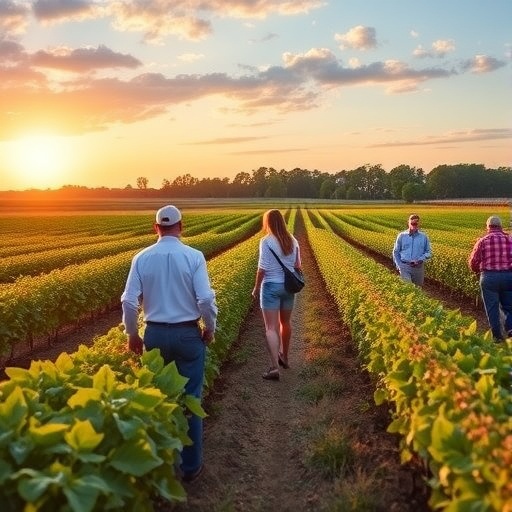In the realm of modern agriculture, the integration of artificial intelligence (AI) has ushered in a transformative era marked by unprecedented advances in productivity, sustainability, and precision. Recognizing the growing imperative to bridge AI’s capabilities with agricultural sciences, the University of Arkansas System Division of Agriculture is pioneering this frontier through its Center for Agricultural Data Analytics. This initiative is set to culminate in the inaugural AI in Agriculture Symposium, scheduled for September 15, 2024, at the Don Tyson Center for Agricultural Sciences in Fayetteville, Arkansas, as well as an online platform to ensure broad accessibility.
The symposium represents a landmark convergence of leading academics, industry specialists, and data scientists focusing on pioneering AI algorithms, machine learning models, and computational tools tailored for agricultural applications. This event not only underscores the rapid adoption of AI in sectors that were traditionally analog and labor-intensive but also signals a paradigmatic shift in how agricultural research, management, and policy formulation are increasingly data-driven. Attendees will gain insights into the deployment of autonomous systems, predictive analytics, and complex sensor data integration, all of which contribute to enhanced crop yields, ecosystem monitoring, and resource optimization.
Samuel B. Fernandes, an assistant professor specializing in agricultural statistics and quantitative genetics, spearheads the organization of this interdisciplinary symposium. His research integrates advanced quantitative methods with computational biology to unravel genetic and environmental interactions influencing crop performance. Fernandes emphasizes the necessity of empowering agriculture students and researchers with direct experiences in AI, facilitating collaborations that not only speed innovation but also critically evaluate AI’s role in sustainable farming and food security.
The symposium agenda commences early morning with a comprehensive overview by Jean-François Meullenet, senior associate vice president for agriculture research and the director of the Arkansas Agricultural Experiment Station. This introductory session will set the tone for a day deeply entrenched in technical discourse, traversing AI’s potential to remodel genetic selection, pest management, and supply chain efficiencies. The event’s structure encourages a rich exchange of methodology and best practices, with technical sessions foliated with case studies involving cutting-edge research and hands-on demonstrations.
Speakers at the symposium include distinguished figures from renowned institutions and corporations, encompassing a broad spectrum of expertise. Girish Chowdhary from the University of Illinois Urbana-Champaign will share advances in robotic automation and multi-agent systems designed for autonomous field operations. Rohit Sanjay of Tyson Foods will present real-world implementations of AI-driven process automation within food production. Other notable contributors include Rich Adams and Aranyak Goswami, who bring perspectives grounded in agricultural statistics and computational biology, respectively, highlighting data analytics for pest population modeling and integrative genomics approaches for crop improvement.
In addition, experts from Bayer Crop Science contribute insights into machine learning methodologies for chemical usage optimization and genomic data stewardship, represented by Nicholas Ames and Erin Gilbert. Walmart Global Tech’s Alon Arad will discuss AI frameworks and analytics geared toward supply chain resiliency, while Ana Maria Heilman-Morales, directing the Big Data Pipeline Unit at North Dakota State University, will facilitate a critical roundtable addressing the role of AI as a multidisciplinary catalyst within agricultural sciences. This session seeks to foster dialogues intersecting bioinformatics, environmental monitoring, and data infrastructure.
Parallel to the symposium, the University of Arkansas is also hosting the inaugural AI in Ag Hackathon, held on September 13-14 at the Mullins Library on the Fayetteville campus. This two-day intensive hackathon challenges graduate students to develop AI-driven solutions for pressing real-world agricultural problems such as predictive disease outbreak models, precision irrigation scheduling, and automated fruit harvesting logistics. The hackathon not only serves as a hands-on platform to deploy theoretical AI models but also acts as a talent incubator, preparing the next generation of agtech innovators with robust computational expertise.
Participation details are inclusive, with a registration deadline of September 7 for physical attendance and no cutoff for online viewers, ensuring that geographic barriers do not impede access to this critical knowledge exchange. Further, the hackathon’s registration remains open until September 10, inviting graduate candidates from multiple universities within Arkansas. The competitive element is strategically designed to hone practical problem-solving acuity, culminating in presentations at the symposium itself, where the top teams will articulate their technical solutions to an expert audience.
This initiative is a collaboration among the Center for Agricultural Data Analytics, the Dale Bumpers College of Agricultural, Food and Life Sciences, and Bayer Crop Science, showcasing an effective public-private partnership model aimed at accelerating the commercialization and academic research pipeline of AI technologies in agriculture. The integration of computational methods spanning from high-throughput phenotyping to environmental data fusion highlights the multifaceted applications of AI in tackling global agricultural challenges.
Agricultural sustainability and efficiency increasingly depend on advancements in computational modeling, as well as real-time decision support systems. The Arkansas initiative reflects this global trend with a dedication to equitable access and interdisciplinary engagement, promoting ethical AI usage aligned with biosafety, ecological stewardship, and genetic data security considerations. This comprehensive approach exemplifies how the agricultural community is leveraging AI not only as an operational enhancement tool but as a transformative scientific paradigm redefining plant, soil, and environmental sciences.
For media inquiries and further information, Samuel Fernandes—whose expertise bridges statistical genetics and AI integration—is available at samuelbf@uark.edu. The event and its associated programs epitomize the University of Arkansas System Division of Agriculture’s commitment to fostering innovation in agriculture through technology-driven research and education, thereby advancing sustainable agriculture and resilient food systems for the future.
Subject of Research: Artificial intelligence applications in agriculture including statistics, genetics, automation, and data analytics.
Article Title: Inaugural Arkansas AI in Agriculture Symposium Spotlights Cutting-Edge AI Innovations in Farming Science
News Publication Date: September 15, 2024
Web References:
- AI in Agriculture Symposium: https://aaes.uada.edu/events/ai-in-agri-symposium/
- Arkansas Agricultural Experiment Station: https://aaes.uada.edu/
- AI in Ag Hackathon Registration: https://forms.cloud.microsoft/r/hBSih5Uc3d
Image Credits: U of A System Division of Agriculture
Keywords: Artificial intelligence, agricultural statistics, quantitative genetics, automation, crop science, machine learning, agricultural data analytics, food production, sustainable agriculture, robotics, genomics, ecological modeling




